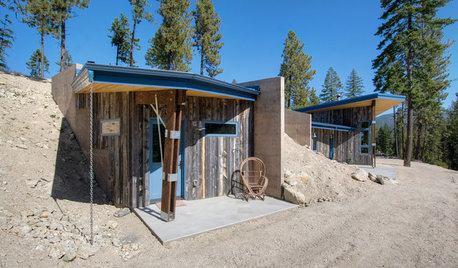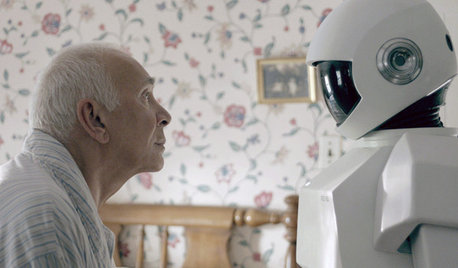Dirt! The Movie
seedmama
14 years ago
Related Stories

MY HOUZZMy Houzz: Modern Loft in a Converted 1920s Movie Theater
A San Francisco couple creates an oasis in a converted movie palace in the Lower Haight
Full Story
HOUZZ TOURSHouzz Tour: Having Fun With a Half-Buried House
Layers of dirt help create energy efficiency and an unusual look on a steep slope in Washington state
Full Story
URBAN GARDENSSit Back and Enjoy the View From This Brooklyn Rooftop Garden
A landscaper transforms his apartment building’s rooftop into a lush retreat where he and his friends relax and sometimes take in a movie
Full Story
HOME TECHHome Tech: Where Is My Robot Housekeeper?
We haven't mastered the all-purpose humanoid house cleaner, but these gadgets make quick work of chores
Full Story
KIDS’ SPACESDream Spaces: 12 Disney-Worthy Kids’ Rooms
These fantasy bedrooms can transport children into a magical world of make-believe
Full Story
HOUZZ TOURSHouzz Tour: Charming, Bright Country Home in France
An old Normandy rectory house and barn become a lovely tailored home for a Parisian couple
Full Story
ROOM OF THE DAYRoom of the Day: Cool Poolside Cabana for Entertaining and Relaxing
A Massachusetts couple creates a fun indoor-outdoor space for entertaining at home year-round
Full Story
MOST POPULAR50 Shades of Gray
Gray is hotter than ever, thanks to a hit novel full of risks and dark secrets. Tell us: Which paint shade possesses you?
Full Story
DECLUTTERING10 Secrets to a Neat Living Room
Keep the clutter at bay with ‘speed bumps,’ hidden storage and a little-stuff drawer
Full Story
GARAGESHouzz Call: How Do You Put Your Garage to Work for Your Home?
Cars, storage, crafts, relaxing ... all of the above? Upload a photo of your garage and tell us how it performs as a workhorse
Full Story


earthy
marcy3459
Related Discussions
Great movie
Q
Dirt Bombs...
Q
Other fave movies......
Q
Movie about a hoarder
Q
scottokla
marcy3459
elkwc
soonergrandmom
buster52
scottokla
seedmamaOriginal Author
elkwc
owiebrain
earthy
seedmamaOriginal Author
soonergrandmom
scottokla
marcy3459
ezzirah011
earthy
buster52
buster52
scottokla
annieokie
elkwc
buster52
buster52
earthy
buster52
earthy
elkwc
scottokla
soonergrandmom
buster52
buster52
elkwc
buster52
scottokla
buster52
scottokla
owiebrain
elkwc
buster52
scottokla
elkwc
buster52
seedmamaOriginal Author
elkwc
seedmamaOriginal Author
elkwc
soonergrandmom
jleroi